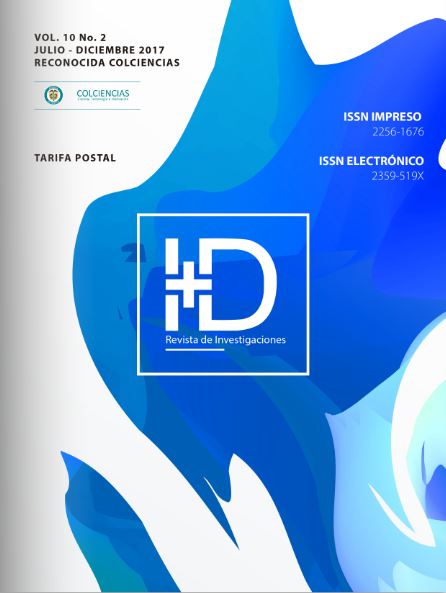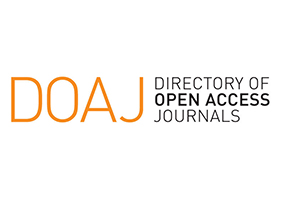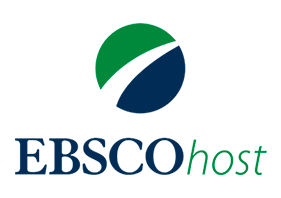Propuesta metodológica para la evaluación del portafolio de proyectos: caso de estudio “Oleaginosas promisoras”
DOI:
https://doi.org/10.33304/revinv.v10n2-2017003Palabras clave:
Evaluación portafolio proyectos, Análisis Jerárquico, Super Decisiones Proyectos de I D, Sistema General de Regalías (SGR)Resumen
El presente trabajo propone una metodología de evaluación del portafolio de proyectos para un programa financiado por el Fondo de Ciencia Tecnología e Innovación, caso de estudio: “Investigación Técnico-Social de Oleaginosas Promisoras con miras a su Desarrollo Agroindustrial”. Para tal fin, se estudiaron diferentes métodos de evaluación de portafolios de proyectos presentados en la literatura especializada bajo las especificidades propias del caso de estudio y se seleccionó el Proceso de Análisis Jerárquico como el más acorde, entregando una ponderación para los criterios y sub-criterios propuestos en la estructura jerárquica y una calificación para los 15 proyectos que componen el portafolio. El desarrollo matemático de la metodología se realizó mediante el Software Super Decisions y la herramienta Survey Monkey para la recopilación de información. Los tres sub-criterios con mayor peso fueron respectivamente: recursos humanos, viabilidad técnica y articulación de actores y los criterios fueron viabilidad, recursos y beneficios. Entre los proyectos con las mejores puntuaciones destacaron los de base social como los de mayor probabilidad de éxito en el paso a una siguiente fase de desarrollo y/o implementación.Descargas
Citas
Aragonés, P. B., Chaparro-González, F., Pastor-Ferrando, J.-P., & Pla-Rubio, A. (2014).
An AHP (Analytic Hierarchy Process)/ANP (Analytic Network Process)-based multi-criteria decision approach for the selection of solar-thermal power plant investment projects. Energy, 66, 222–238. doi:10.1016/j.energy.2013.12.016
Archer, N. ., & Ghasemzadeh, F. (1999). An integrated framework for project portfolio selection. International Journal of Project Management, 17(4), 207–216. doi:10.1016/S0263-7863(98)00032-5
Chen, C.-T., & Cheng, H.-L. (2009). A comprehensive model for selecting information system project under fuzzy environment. International Journal of Project Management, 27(4), 389–399. doi:10.1016/j.ijproman.2008.04.001
de Loë, R. C., Melnychuk, N., Murray, D., & Plummer, R. (2016). Advancing the State of Policy Delphi Practice: A Systematic Review Evaluating Methodological Evolution, Innovation, and Opportunities. Technological Forecasting and Social Change, 104, 78–88. doi:10.1016/j.techfore.2015.12.009
Eilat, H., Golany, B., & Shtub, A. (2006). Constructing and evaluating balanced portfolios of R&D projects with interactions: A DEA based methodology. European Journal of Operational Research, 172(3), 1018–1039. doi:10.1016/j.ejor.2004.12.001
Forman, E., & Peniwati, K. (1998). Aggregating individual judgments and priorities with the analytic hierarchy process. European Journal of Operational Research, 108(1), 165–169. doi:10.1016/S0377-2217(97)00244-0
Ghapanchi, A. H., Tavana, M., Khakbaz, M. H., & Low, G. (2012). A methodology for selecting portfolios of projects with interactions and under uncertainty. International Journal of Project Management, 30(7), 791–803. doi:10.1016/j.ijproman.2012.01.012
Grošelj, P., Zadnik Stirn, L., Ayrilmis, N., & Kuzman, M. K. (2015). Comparison of some aggregation techniques using group analytic hierarchy process. Expert Systems with Applications, 42(4), 2198–2204. doi:10.1016/j.eswa.2014.09.060
Huang, C.-C., Chu, P.-Y., & Chiang, Y.-H. (2008). A fuzzy AHP application in government-sponsored R&D project selection.
Omega, 36(6), 1038–1052. doi:10.1016/j.omega.2006.05.003
Mateo, J. R. S. C. (2012). Multi Criteria Analysis in the Renewable Energy Industry. In Multi-Criteria Analysis in the Renewable Energy Industry, Green Energy and Technology (pp. 33–41). doi:10.1007/978-1-4471-2346-0
Miller, G. (1995). The magical number seven, plus or minus two: some limits on our capacity for processing information. Psychological Review, 101(2), 343–352. doi:10.1037/h0043158
Meade, L. M., & Presley, a. (2002). R&D project selection using the analytic network process. Engineering Management, IEEE Transactions on, 49(1), 59 –66. doi:10.1109/17.985748
Mulliner, E., Malys, N., & Maliene, V. (2015). Comparative analysis of MCDM methods for the assessment of sustainable housing affordability. Omega, 59, 146–156. doi:10.1016/j.omega.2015.05.013
Saaty, T. L. (2000). Fundamentals of decision making and priority theory with the Analytic Hierarchy Process .
Saaty, T. L. (2008). Decision making with the analytic hierarchy process. International Journal of Services Sciences, 1(1), 83. doi:10.1504/IJSSCI.2008.017590
Smith-Perera, A., García-Melón, M., Poveda-Bautista, R., & Pastor-Ferrando, J. P. (2010). A Project Strategic Index proposal for portfolio selection in electrical company based on the Analytic Network Process. Renewable and Sustainable Energy Reviews, 14(6), 1569–1579. doi:10.1016/j.rser.2010.01.022
Sokmen, N. (2014). A multi-criteria project assessment framework for R&D organizations in the IT sector. In PICMET 2014 - Portland International Center for Management of Engineering and Technology, Proceedings: Infrastructure and Service Integration (pp. 2455–2466). Institute of Electrical and Electronics Engineers Inc. Retrieved from http://www.scopus.com/inward/record.url?eid=2-s2.0-84910122044&partnerID=tZOtx3y1
Tavana, M., Khalili-Damghani, K., & Sadi-Nezhad, S. (2013). A fuzzy group data envelopment analysis model for high-technology project selection: A case study at NASA. Computers & Industrial Engineering, 66(1), 10–23. doi:10.1016/j.cie.2013.06.002
Vidal, L. A., Marle, F., & Bocquet, J. C. (2011). Using a Delphi process and the Analytic Hierarchy Process (AHP) to evaluate the complexity of projects. Expert Systems with Applications, 38(5), 5388–5405. doi:10.1016/j.eswa.2010.10.016
Wu, W., Chiang, C., & Lin, C. (2008). Comparing the aggregation methods in the analytic hierarchy process when uniform distribution. WSEAS Transactions on Business and Economics, 5, 82–87.
SurveyMonkey®. Copyright © 1999-2016. http://surveymonkey.com/
SuperDecisions Software. Versión 2.0 [Software de
computación].http://www.superdecisions.com/












